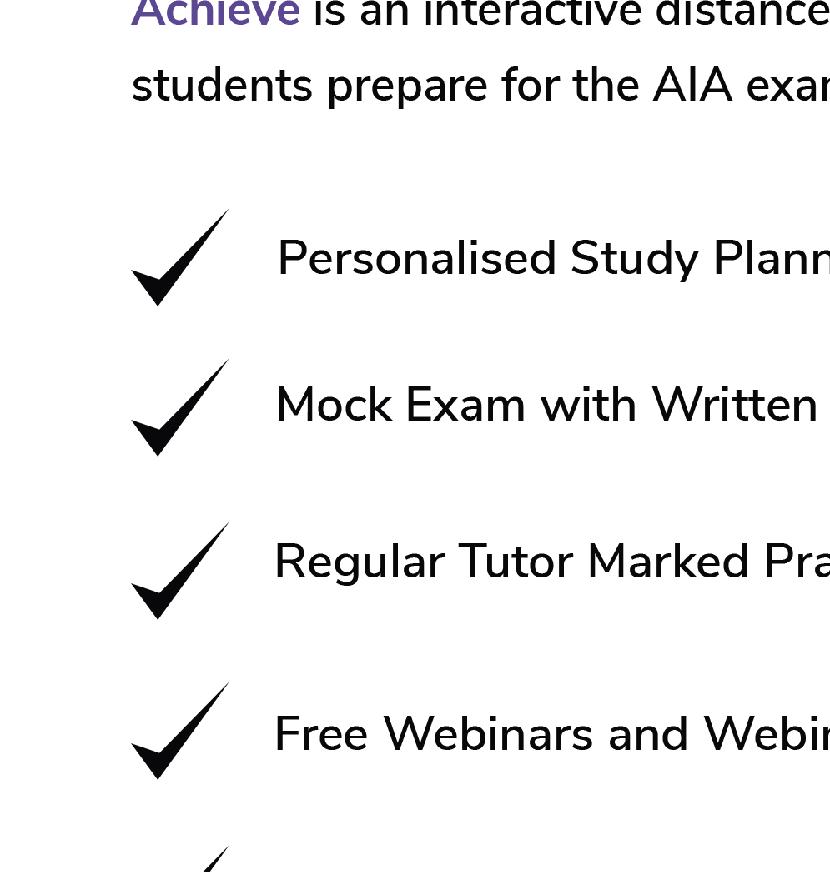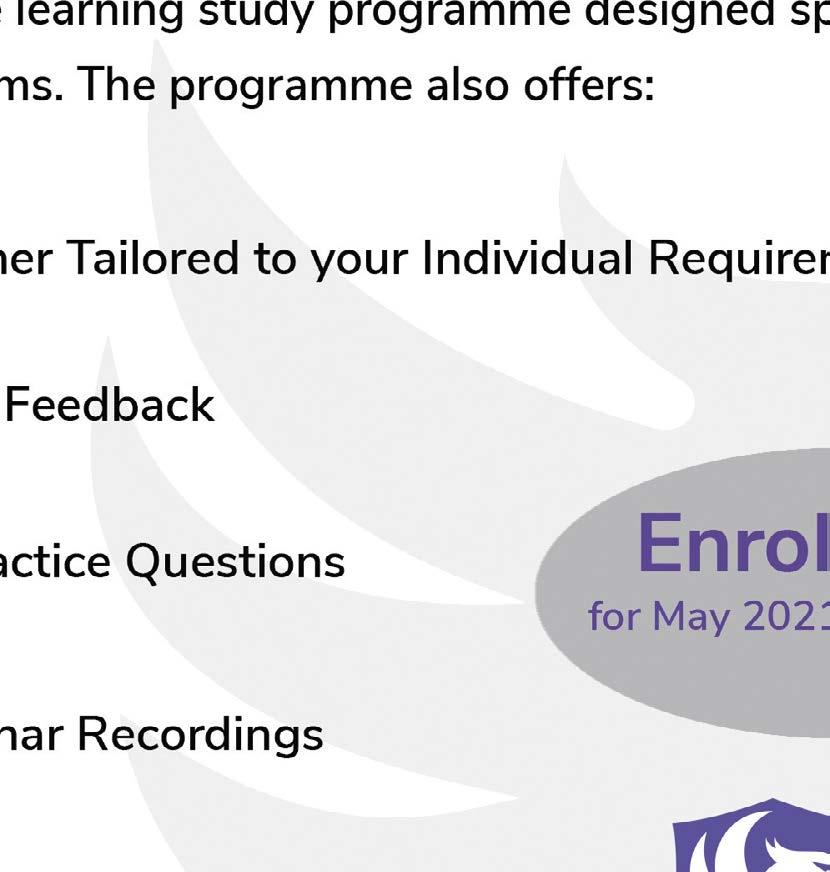
18 minute read
Students
Developments in audit practice
This article provides exam support to students sitting the audit papers in May 2021.
Akey emerging trend in internal and external audit is the use of data analytics to generate core analysis to highlight anomalies in the integrity of the accounting data.
Data analytics and ethics Students should ensure that they have explored the role of data analytics, its strengths and limitations in practice for both internal and external auditors in their wider reading. At the time of writing, the IESBA Technology Working Group is exploring the impact of big data, blockchain, data analytics, etc. on the ethics of the auditor but this will not report until mid 2020 and therefore is an emerging issue. However, the IESBA issued an ED Proposed Revisions to the Code to Promote the Role and Mindset Expected of Professional Accountants in July 2019, which aims to identify opportunities to emphasise and reinforce the mindset and behavioural characteristics expected of professional accountants in business and in public practice. This is discussed in more depth in the professional judgment section of this review.
Audit reporting Students are reminded that audit reporting is another core area of the syllabus and that it extends more widely than the conventional audit report. The development of the extended audit report in the UK has influenced international audit reports and students should be familiar with this. There do, however, remain weaknesses in reporting and the Brydon Review recommends the following areas for improvements: ● Create continuity between successive audit reports. ● Provide greater transparency over differing estimations, perhaps disclosing graduated findings. ● Call out inconsistencies in information made public. ● Reference external negative signals and how they have informed the audit.
The standard ISA 720 The Auditor’s Responsibilities relating to Other Information was revised in June 2016 and its impacts are starting to be seen in the current cycle of audit reporting. Under ISA 720, the auditor is responsible for ensuring that other information included in the audited financial statements is not materially inconsistent with either the financial statements or their understanding of the entity’s position from their knowledge of the business gained during the audit. This relates to all of the narrative information issued by the reporting entity and covers all of the material issued before the audit report. This supports the ethical requirement that the auditor avoids being knowingly associated with information that is either materially false or misleading. It is particularly focused on the need to make the auditor’s comment on the extended disclosure requirements for directors around risk and viability statements. The standard requires that the auditor specifically reviews and comments upon:
a. the directors’ confirmation in the annual report that they have carried out a robust assessment of the principal risks facing the entity, including those that would threaten its business model, future performance, solvency or liquidity; b. the disclosures in the annual report that describe those risks and explain how they are being managed or mitigated; and c. the directors’ explanation in the annual report as to how they have assessed the prospects of the entity, over what period they have done so and why they consider that period to be appropriate, and their statement as to
whether they have a reasonable expectation that the entity will be able to continue in operation and meet its liabilities as they fall due over the assessment period, including any related disclosures drawing attention to any necessary qualifications or assumptions.
ISA 720 Auditors’ Responsibilities Relating to Other Information 2016
This raises an interesting issue within the idea of the expectation gap, as the auditor’s requirement to comment has been operationalised as a statement that the auditors have reviewed the issues detailed above and have nothing material to add or draw attention to. The Brydon Review further proposes a resilience statement which would replace the existing going concern and viability statements: ● The short term reporting component of the statement would incorporate the existing going concern assessment, but with enhanced transparency, including the disclosure of material uncertainties that could impact on the company as a going concern before any mitigating action has been taken into account. ● The medium term component would be a more robust and transparent version of the existing viability statement. This component of the resilience statement should include stress testing of various scenarios that could threaten the company’s business model, drawing on existing models currently used by the Prudential Regulation Authority for financial services companies. ● The long term component would provide an opportunity for directors to set out how they are positioning the business strategically to address the risks of, for example, climate change and other potential existential threats.
These suggestions highlight current areas of concern in reporting and students should be familiar with these. The directors must ensure that the annual report, taken as a whole, is fair, balanced and understandable, and provides the necessary information for shareholders to assess the group’s position, performance, business model and strategy. In an examination context, the narrative information around risk reporting or going concern assessment, or other information issued with the financial statements, may not be accurate and students should be prepared to develop an appropriately worded report. Sustainability reporting and assurance The UN Sustainable Development Goals are being used as a framework by investors to assess the exposure of companies to risks to their ability to create sustainable value within the organisation. This links into the developments of integrated reporting and the recent report by the Task force for Climate Based Financial Disclosure. Policy makers within governments and regulators are also looking to these goals to drive the future direction of sustainability in companies. Within this framework, the sustainability accounting standards and other sustainable measures are being developed and the former were issued at the end of 2018. The 2017 recommendations of the Financial Stability Board (FSB) Task Force for Climate related disclosures, which seek to establish a framework for an organisation’s disclosures “that will help financial market participants understand their climate risk”, were widely adopted in the 2018 corporate reports. This is creating a significant market opportunity for sustainability assurance and sustainability consultancy as the standards provide a key framework against which corporate sustainable reporting can be assured. The approach of the professional practice to such an assignment is the same as any other assurance assignment. It consists of initially identifying the subject matter for the engagement and the interested parties who may be using this information. The standards against which the assurance would be carried out must
Exercise of Professional Judgment 120.5 A1: Professional judgment involves the application of training, knowledge and experience taking into account the nature and scope of the professional activity being undertaken. When exercising professional judgment, it is important that the professional accountant obtains a sufficient understanding of the facts and circumstances known to the accountant to identify, evaluate and address threats to compliance with the fundamental principles. In obtaining this understanding, the accountant might consider, among other matters, whether: ● there is an inconsistency between the known facts and circumstances and the accountant’s expectations; ● the information provides a reasonable basis on which to reach a conclusion; ● other reasonable conclusions could be drawn from the information being considered; ● the accountant’s own preconception or bias might be affecting the accountant’s judgment; and ● the accountant’s own expertise and experience are sufficient, or whether there is a need to consult with others with relevant expertise or experience. Reasonable and Informed Third Party 120.5 A2A1: The reasonable and informed third party test is a consideration by the professional accountant about whether the same conclusions would likely be reached by another party. Such consideration is made from the perspective of a reasonable and informed third party, who weighs all the relevant facts and circumstances that the accountant knows, or could reasonably be expected to know, at the time the conclusions are made. The reasonable and informed third party does not need to be an accountant, but would possess the relevant knowledge and experience, to understand and evaluate the appropriateness of the accountant’s conclusions in an impartial manner.
Proposed Application Material Relating to: a. Professional scepticism: linkage with the fundamental principles; and b. Professional judgment: emphasis on understanding facts and circumstances.
Exposure Draft 17.
© May 2017 by the International Federation of Accountants (IFAC).
be explored and clarified. This process is essential to clarify the real risk areas in the assurance assignment, to understand the concerns of the company and to understand what assurance is seeking to achieve. A key idea for the auditor providing assurance against new sustainability standards is the idea of what would render the information useful. In common with all other information for decision making, this would reflect the ideas of appropriate standards of relevance, completeness, reliability, neutrality and understandability. This debate mirrors other debates around quality reporting, including narrative reporting, risk reporting and KPI reporting. There are challenges in ensuring that the information is fairly represented, unbiased, consistent and transparent. The ideas from the FRC in its Cutting the Clutter publication may help this wider issue to be appreciated. Further information can be found at: ● www.sasb.org/standards-overview/downloadcurrent-standards ● www.globalreporting.org/how-to-use-the-gristandards ● www.fsb-tcfd.org Professional ethics IFAC has noted that “public interest considerations must remain paramount in an age of Covid-19” and has produced an interesting article exploring some of the ethical and public interest issues raised by the current reporting and auditing environment (see bit.ly/38N0Iv8). The key issues highlighted are the heightened risk of fraud and error in corporate reports caused by the stress within the economy exacerbated by the challenges of remote working. It notes that “greater transparency and disclosure of forwardlooking information on an organisation’s operating performance, financial position, liquidity and future prospects are more critical than ever even though current circumstances make this more challenging. Professional accountants in business need to make reasonable, good faith judgments in the context, and, on the basis of, information currently available.” Focus on audit quality This IFAC framework (see bit.ly/2XHQjKW) provides a comprehensive overview of the factors driving audit quality at an engagement, firm and national level. It reiterates much of previous guidance but contextualises the ideas within the debate around the increasing focus on public interest. The problems in ensuring audit quality in audit firms are clearly not easy to resolve. The regulatory review into audit firms in the UK routinely highlights areas of weakness, and the spate of recent high profile audit scandals in public interest entities would support the idea that these problems result in poor quality in practice. It is therefore vital that students understand how audit quality is promoted and safeguarded in audit firms and it is an area that is frequently examined in this paper.
“Audit quality policies in audit firms
Audit is vital to investor confidence in UK companies. Poor quality audit work remains unacceptably common. The latest audit inspections for 2018/19, which relate principally to audits of companies’ December 2017 year ends, found 75% of FTSE 350 audits reviewed were good or required no more than limited improvements, compared to 73% in 2017/18. No firms achieved the FRC’s audit quality target for 90% of FTSE 350 audits to meet this standard. Looking across all audit reviews completed at the largest seven firms, the outcome was 75% compared to 74% in 2017/18. In the reports published, each firm has committed to specific actions to enhance audit quality including, for the worst performers, detailed audit quality improvement plans. The FRC will assess the success of these initiatives and secure further action if necessary. The FRC found cases in all seven firms where auditors had failed to challenge management
sufficiently on judgmental issues. This has been a recurring finding over a number of years and it can have many contributory factors. These include the mindset of audit teams, especially an absence of professional scepticism in evaluating evidence presented by company management, tight reporting deadlines and the complexity of the judgments involved. Familiarity is also a factor arising from long-standing audit relationships, particularly if the company comes to be considered as “the client” for the auditor, rather than the shareholder or investor.”
Financial Reporting Council (2019) “Firms’ Audit Quality Monitoring”
In the UK, there is evidence that audit firm quality procedures are not as robust as the regulator might prefer. There is also evidence that the audit firms have a tendency to underestimate problems with their own work. This is not entirely unexpected as subconscious bias will tend to mean that auditors who work within a specific audit culture will not be able to appreciate its weaknesses and it is very difficult for an audit firm to be objective about its own quality. However, there is an increased focus from IFAC and national regulators on firm audit quality policies and monitoring of such. A key issue arising from the impact of Covid-19 on audit firms is the change to remote working and the challenges this creates for ensuring audit quality and ethical compliance. The IESBA has produced a very helpful guide which explores how ethics may be compromised due to these issues, with some useful ideas of how this can be mitigated in practice (see bit.ly/3ssSMXO). IFAC has also explored how Covid-19 issues may increase the need for more extensive and frequent engagement quality reviews. The challenge of performing these remotely is also addressed and IFAC observes the following: ● Effective communication between the reviewer and the audit team is important to maintain virtually. ● Auditors are having to make more significant judgments than ever before throughout all stages of the audit, and the reviewer will need to undertake an objective evaluation of these. It may be beneficial to have the reviewer look at significant judgment areas sooner rather than later. ● A small or medium sized practice may need to engage with an external reviewer outside of their own practice. Professional judgment Professional judgment remains a key area of concern to regulators. The Brydon Review recommends that “ARGA (the new UK Regulator) should revisit the existing definition of professional judgment with a view to strengthening, and demonstrating better, the use of judgment in audit” (see bit.ly/3nMfPZZ). The developing ideas in ED Proposed Revisions to the Code to Promote the Role and Mindset Expected of Professional Accountants 2019 articulate key areas that all professional accountants should consider to ensure that professional judgment is robust. This includes the following: ● Obtain and understand information relevant for making reliable judgments based on facts and circumstances known to them. ● Make informed challenges of views developed by others. ● Be sensitive to the integrity of information, including the source of the information and the appropriateness of its presentation. ● Withhold judgment pending thoughtful consideration of all known and relevant available information.
The ideas around acting with integrity have also been further developed to expand from the idea of fair dealing and truthfulness and the requirement to be straightforward and honest in all professional and business relationships. Integrity also requires having the determination to act appropriately when confronting dilemmas and can include: ● standing one’s ground when facing pressure to do otherwise during the course of performing professional activities; and ● challenging others as and when appropriate, even when doing so creates potential adverse personal or organisational consequences. IFAC Exposure Draft 17: Professional Judgment The issues raised above are consistent with the ideas I highlighted from IFAC Exposure Draft 17 – Professional Judgment – Emphasis on Understanding Facts and Circumstances. This is a key area of understanding for students at paper 15. The paper is concerned with the application of understanding and judgment to scenarios raised in the questions and students are expected to show that they are applying professional judgment robustly. “Professional judgment involves the application of training, knowledge and experience taking into account the nature and scope of the professional activity being undertaken. When exercising professional judgment, it is important that the professional accountant obtains a sufficient understanding of the facts and circumstances known to the accountant to identify, evaluate and address threats to compliance with the fundamental principles.” Students should ensure that they are familiar with the debate around professional judgment and the ED 17 in their wider reading to contextualise the emerging debates around auditor conduct. Professional scepticism Professional scepticism continues to be an ongoing issue. The FRC in the UK regards the poor application of professional scepticism as core to compromising the ability of the auditor to robustly challenge management judgment and therefore a significant contributor to recent audit failures. In the UK, there is evidence that audit firm quality procedures are not as robust as the regulator might prefer. There is also evidence that audit firms have a tendency to underestimate problems with their own work.
Core challenges compromise the ability of an auditor to maintain a sceptical mindset. As boards strive to meet faster reporting deadlines, time pressue is increasing.
These include Carillion Plc, Thomas Cook Plc, Patisserie Valerie Plc and others. IFAC is currently reviewing its guidance on professional scepticism in order to meet public expectations and ICAEW has recently published a really helpful and practical insight into professional scepticism in the practice. This highlights some of the core challenges that compromise the ability of an auditor to maintain a sceptical mindset, including time pressure and a lack of situational context. As boards strive to meet faster reporting deadlines, time pressure is increasing. As audit clients become more complex and audit teams work against deadlines without really becoming immersed in the business, commercial factors seem to be conspiring to make being sceptical more difficult. An understanding and appreciation of the developing debate around scepticism is important to ensure that this final paper in audit embeds this critical skill area in students. Further information can be found at: ● www.ifac.org/system/files/publications/files/ Professional-Skepticism-Meeting-PublicExpectations-Consultation-Paper.pdf ● www.icaew.com/-/media/corporate/files/ technical/audit-and-assurance/audit-andassurance-faculty/publications/others/ scepticism-the-practitioners-take.ashx Developments in international ethical standards As all student accountants will be aware, the last few years have not been easy for the reputation of the profession. In the UK, the collapse of Carillion Plc was followed by months of media comment and a government Select Committee Report into the corporate failure. This lack of confidence in the ethics of accounting firms has driven the review of the functioning of the audit market and may see some substantial changes to audit practices over the next few years. This focus on the conduct of auditing firms is by no means limited to isolated cases of Big Four audits of public interest entities causing concern – and the problems relate to audits throughout the world. It is against this evidence of concerns over the quality of accounting ethics that the new International Code of Ethics for Professional Accountants was published last year and came into force on 15 June 2019. In December 2019, the Brydon Review – Assess, Assure and Inform was published. There are a number of very important developments to the new 2018 Code which, if adopted correctly, should do much to resolve some of the problems in ethics evidenced in recent scandals and to help to re-establish the reputation of the accounting profession. The IESBA launched the Code in April 2018 with the statement: “While the fundamental principles of ethics have not changed, major revisions have been made to the unifying conceptual framework – the approach used by all professional accountants to identify, evaluate and address threats to compliance with the fundamental principles and, where applicable, independence.” The substantive revisions to the Code include: ● an enhanced conceptual framework, which includes extensive revisions to “safeguards” throughout the Code that are better aligned to threats; ● strengthened independence provisions regarding long association of personnel with audit clients; ● strengthened provisions relating to offering and accepting of inducements, including gifts and hospitality that apply to both professional accountants in business (PAIBs) and professional accountants in public practice (PAPPs); ● strengthened provisions dedicated to PAIBs, including: ● a new section relating to pressure to breach the fundamental principles; and ● revised provisions relating to the preparation and presentation of information; ● clarifications about the applicability of PAIB provisions to PAPPs; ● new material to emphasise the importance of understanding facts and circumstances when exercising professional judgment; and ● new material to explain how compliance with the fundamental principles supports the exercise of professional scepticism in an audit or other assurance engagements.
Students are reminded that three articles regarding issues raised by the Code were published by AIA in the Student Accounting in July, August and September 2019. Other issues The Brydon Review has proposed a wide range of reform ideas to resolve the ongoing issue with audit and include: ● the inclusion of fraud analysis in the audit remit; ● a replacement of true and fair with present fairly in all material matters; ● a greater focus on going concern; ● a change to audit committee composition to include a wider range of members, not only those from the accounting profession, including those with ‘an enquiring mind and able to make robust independent decisions; ● an alteration in audit scope to extend to the directors’ statements regarding their discharge to the public interest; and ● the development of a new professional body –Corporate Auditing.
Whilst the detail recommendations may be beyond the content of Paper 15, the issues that they debate represent the very real concerns and challenges facing the global profession and students should be familiar with these.














